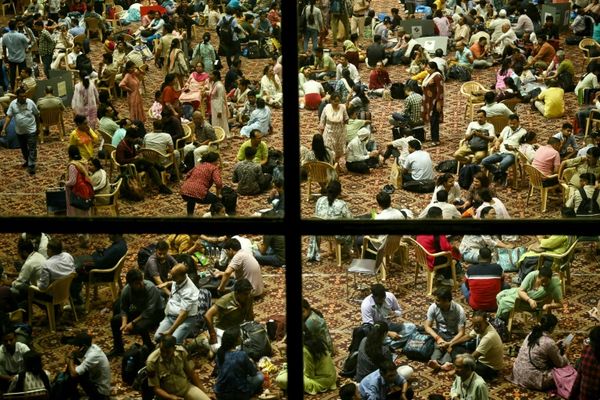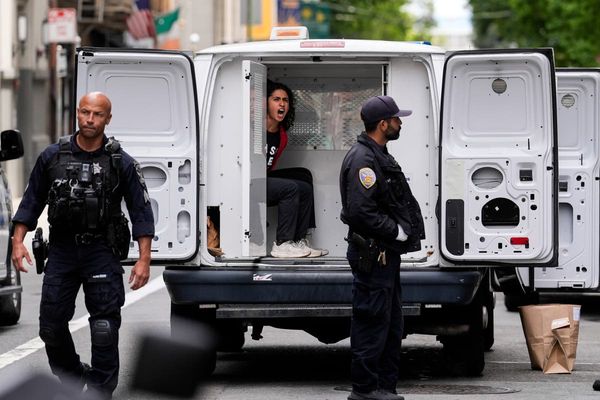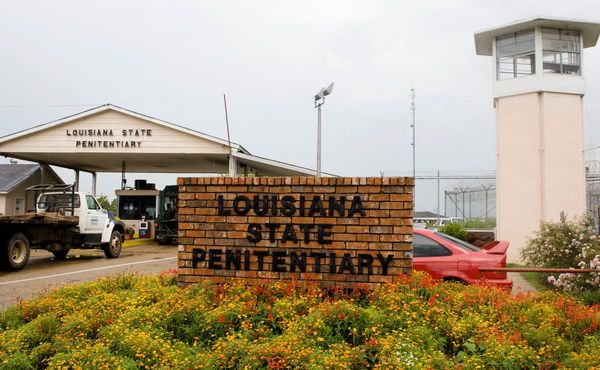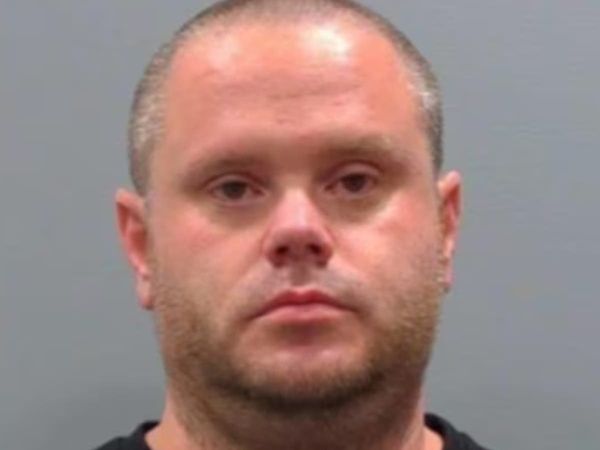
Gaza’s night is dark apart from the glow of rockets, quiet apart from the sound of the bombs, terrifying apart from the comfort of prayer, black apart from the light of the martyrs. Good night, Gaza.

Hiba Abu Nada’s final post to X on 9 October was in Arabic. The poet was killed in her home, south of Gaza City, by an airstrike two weeks later.
Last week another poet, Refaat Alareer, was killed by an airstrike. Alareer was a professor of English literature at the Islamic University of Gaza, where he taught Shakespeare, among other subjects. One of his latest works widely shared, again on X, concludes with the words: “If I must die, let it bring hope, let it be a tale.”
The words of both poets join an anthology of Palestinian writing weaving together history, politics and art across time.
“It is hard to speak of poetry and feeling in a time where our collective inaction is facilitating a horrific slaughter,” the Australian writer Omar Sakr says.
But “poems can help bring people together and tie feelings to doing”.
Sakr, born to Lebanese and Turkish Muslim migrants, is describing how writers in Australia as well as globally are using their art, and referencing that of others, to host community events and raise funds in support of civilians in Gaza.

The current conflict was triggered on 7 October by the killing of 1,200 people in Israel and the taking of hundreds of hostages by Hamas. It has led to a full-scale assault by Israel on the Gaza Strip, with upwards of 17,000 reported killed – mostly civilians.
From online poetry forums to small gatherings and readings, thousands of dollars have been raised at events as far away as New York, London and Sydney.
“One meaning of the Arabic word for poetry – sha’ara – is ‘to feel’,” Sakr says. “To feel is human. We don’t need more than this, particularly in a political and social climate of dehumanisation.”
In New York an exhibition celebrating poets who have been censored, persecuted or banned around the world was organised “before all this happened”, says Sara M Saleh, an Australian human rights lawyer and author born in Cairo to a Lebanese-Palestinian mother and an Egyptian father.
Given that the event fell in the first weeks of the Israel-Hamas war, “of course my response was to share poems by Palestinian poets”, she says.
One of those was by Dareen Tatour, an Arab Israeli poet who was sentenced to five months in prison in 2018 for, in part, reading one of her poems that was to become a symbol of defiance against the Israeli state. The poem, which declared she “will not succumb to the ‘peaceful solution’”, included the lines:
In Jerusalem, I dressed my wounds and breathed my sorrows / And carried the soul in my palm / For an Arab Palestine … / Resist, my people, resist them ….”
Tatour was initially convicted of inciting terrorism and supporting a terrorist organisation after posting on social media and reading her poem in a video. Her incarceration sparked criticism from Israeli writers and her conviction over the poem itself was later reversed.
Dr Atef Alshaer, who edited A Map of Absence: An Anthology of Palestinian Writing on the Nakba, says Palestinian resistance literature emerged in the 1930s under British rule.
“It was a literature that celebrated the Palestinian homeland and the love people have for their land, on the one hand, and also depicted the suffering and travails of the Palestinian people and called on them to resist.”
Israeli-Arab tensions have persisted for 75 years since the state of Israel was established and at least 700,000 Palestinians were expelled from or fled their homes.

After 1948 Palestinian writing also focused on “recollection and hope in the face of enormous odds and challenges represented by the Israeli occupation”, Alshaer says.
Writers including Mahmoud Darwish, Samih al-Qasim, Fadwa Tuqan and Ghassan Kanafani “revolutionised Palestinian writing” by articulating rootedness to the land and celebration of identity, according to Alshaer.
Darwish wrote that “every beautiful poem is an act of resistance”.
Saleh says poetry allows Palestine to “name what is going on”.
“That is part of the reason why Israel is so afraid of the artists.”
She says she continues to share poems of Palestinian experiences “as a way to turn attention to what is going on at the moment”.
“It was kind of like a battle cry, or a rallying call, with words,” she says.

Other community events have been held across New York – from Brooklyn Poets’ snap event Palestine Benefit Reading that raised almost US$4,000 for the charity Medical Aid for Palestinians, to a panel event in Manhattan in which Columbia University’s Prof Rashid Khalidi and celebrated writers discussed the “urgent” need to “speak out” for Palestine.
In the UK the Cypriot poet and publisher Anthony Anaxagorou organised Out-Spoken Press’s virtual Poets for Palestine event – which he says “was born out of frustration”.
“This is real life,” he says. “It is not news. It is not a Guardian article. Future generations, when this becomes part of history books, will ask: what did you do?”
The event featured readings from writers around the world, including Australia, and raised almost £25,000 for Medical Aid for Palestinians.

And 12 Australian writers joined another global poetry solidarity reading for Palestine in November, hosted by the Australian-Palestinian writer Samah Sabawi.
“All steps towards freedom and justice in any culture are always dependent on mass-based literacy movements, because degrees of literacy determine how we see what we see,” the Lebanese-Australian novelist Michael Mohammed Ahmad says.
His Sweatshop Literacy Movement has raised A$10,000 through a campaign that sends the profits from sales of Prof Ghassan Hage’s book The Racial Politics of Australian Multiculturalism to Australian-Palestinian charities.
“How does that relate to the situation [in Gaza]? A very long history of dehumanising Arab and Muslim communities.”
Ahmad says his “little publisher in western Sydney” has attracted “tremendous support” from across the country. By contrast, he argues, politicians in Australia aren’t reflecting growing public support for Palestine.
“Leaders are meant to represent the conscience of the country. They are meant to report to the world on what our country is feeling and they are not doing that.”
Saleh argues that writing and art “provides an altar that people can see and understand – this is what I’m fighting for”.
“Once people connect with poets and artists, our books and art, they begin to question … the stereotypes they might hold, and they can start to become dismantled.”







